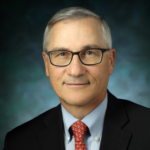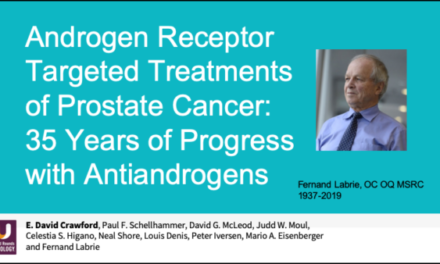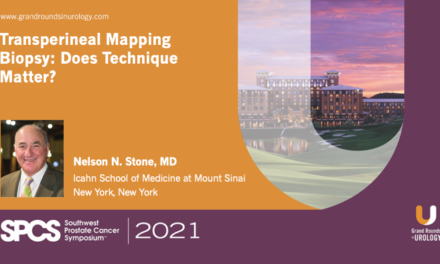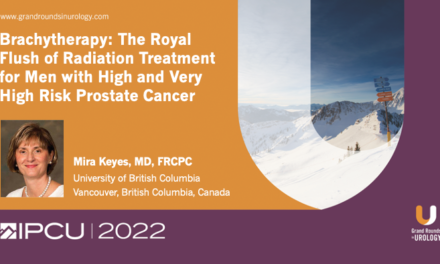Gerald L. Andriole, Jr., MD, presented “The OPTIMUM Trial: 29 MHz Micro-Ultrasound vs. MRI in Diagnosis of Prostate Cancer” for the Grand Rounds in Urology audience in November 2021.
How to cite: Andriole, Gerald L. “The OPTIMUM Trial: 29 MHz Micro-Ultrasound vs. MRI in Diagnosis of Prostate Cancer.” November 2021. Accessed Sep 2025. https://grandroundsinurology.com/the-optimum-trial-29-mhz-micro-ultrasound-vs-mri-in-diagnosis-of-prostate-cancer/
The OPTIMUM Trial: 29 MHz Micro-Ultrasound vs. MRI in Diagnosis of Prostate Cancer
Gerald L. Andriole, Jr., MD, Robert K. Royce Distinguished Professor and Chief of Urologic Surgery at Barnes-Jewish Hospital, the Siteman Cancer Center, and Washington University School of Medicine in St. Louis, Missouri, introduces the OPTIMUM trial comparing high-resolution 29 MHz micro-ultrasound to MRI in the diagnosis of prostate cancer. After an introduction by E. David Crawford, MD, Professor of Urology at the University of California, San Diego, and Editor-in-Chief of Grand Rounds in Urology, Dr. Andriole explains that micro-ultrasound is a novel ultrasound-based system operating at 29 MHz that results in a 300 percent improvement in resolution compared to conventional ultrasound. He explains that micro-ultrasound can be used for transrectal or transperineal biopsy, with or without MRI. Dr. Andriole also notes that, like MRI with PI-RADS, micro-ultrasound has its own prostate risk identification using micro-ultrasound (PRI-MUS) classification system and works with all the skills urologists already have. He observes that several small studies have found superior or comparable sensitivity and/or clinically-significant prostate cancer detection with micro-ultrasound as compared to MRI, but that level 1 evidence is lacking. Dr. Andriole explains that the OPTIMUM trial, a 3-arm randomized controlled trial, is intended to fill in that gap and provide better evidence regarding micro-ultrasound’s efficacy. He describes the design of the trial, noting that 1200 biopsy-naïve subjects will be randomized to micro-ultrasound-only biopsy, MRI/micro-ultrasound “FusionVu” biopsy, and MRI/ultrasound biopsy with conventional fusion system, and that the trial is set to begin in winter 2021 and finish by spring 2023. The discussion concludes with a question and answer session in which Drs. Crawford and Andriole discuss which fusion platforms will be used, the price of micro-ultrasound, other potential applications for micro-ultrasound, and more.
ABOUT THE AUTHOR
Gerald L. Andriole, Jr., MD, is the global Chief Medical Officer at Prostatype Genomics. He previously was Professor and Director of Urology in the National Capital Region at the Brady Urologic Institute at Johns Hopkins University. He also formerly served as the Robert K. Royce Distinguished Professor and Chief of Urologic Surgery at Barnes-Jewish Hospital, the Siteman Cancer Center, and Washington University School of Medicine in St. Louis, Missouri.
Dr. Andriole received his medical degree from Jefferson Medical College in Philadelphia, Pennsylvania. He trained in surgery at Strong Memorial Hospital and the University of Rochester, and completed his Urology Residency at Brigham and Women’s Hospital and Harvard Medical School. Subsequently, he was a Fellow in Urologic Oncology at the National Cancer Institute in Bethesda, Maryland. Dr. Andriole has over 40 years of consistent contributions in the areas of prostate cancer screening and prevention research as well as BPH. He has contributed to over 450 peer-reviewed publications. He chaired the Prostate Committee of NCI’s PLCO Cancer Screening Trial, the Steering Committee of the international REDUCE International Prostate Cancer Prevention Trial and the Prostate Committee of the SUO Clinical Trials Consortium. He is a member of the American Urological Association, the Academy of Master Surgical Educators of the American College of Surgeons, the American Surgical Association, the American Association of Genitourinary Surgeons, and the Clinical Society of Genitourinary Surgeons, among other societies.
He has received the Outstanding Achievement Award from the Urologic Oncology Branch of NCI, the Distinguished Clinician Award from Washington University, the Alumni Award from Jefferson Medical College, and the Williams Award for Prostate Cancer Research Excellence from the AUA Urology Care Foundation, among others.





